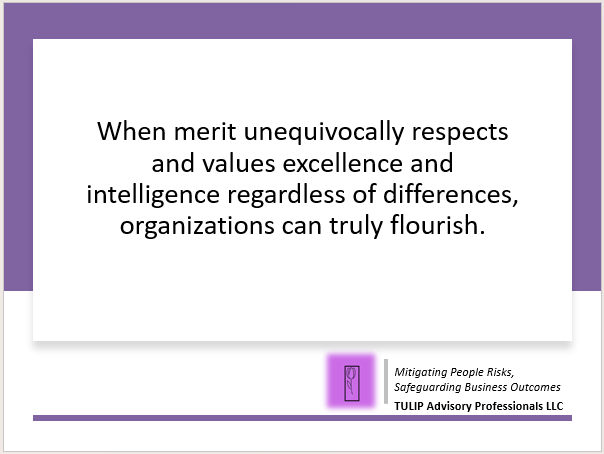As the backlash continues about “DEI”, mostly revolving around connotations associated with the acronym, let’s give benefit of the doubt that the nomenclature is trivial as compared to advancing the work of DEI when that advancement comports with the following principles:
‼️ respecting all people regardless of their differences; ‼️ welcoming and valuing those differences; ‼️ ensuring availability of fair and impartial access to opportunities; ‼️ encouraging all individuals to participate in meaningful engagement; and ‼️inviting individuals to express their concerns without fear of reprisal,
Recently, a new acronym has been touted, replacing the “D” with an “M” and substituting new words for the “E” and the “I”. In addition to insinuation that DEI was void of meritocracy, other grave concerns also arise when this new acronym is carefully assessed whereby there’s a profound and nuanced meaning to be gleaned in the proposed shift from DEI (Diversity, Equity, and Inclusion) to MEI (Merit, Excellence, and Intelligence). Specifically, there are several critical points about the potential limitations of a merit-based approach that might inadvertently overlook the fundamental human aspects of organizational dynamics.
On its face, MEI as an alternative to DEI centers on the seemingly objective concept of merit. Yet, when viewed from a practical application perspective, it reveals how the impact of MEI can actually be quite narrow and reductive. By focusing solely on performance metrics and “how” work is done, MEI risks depersonalizing the workplace and overlooking the rich tapestry of human experience that diversity initiatives seek to recognize and celebrate.
Consider a recent Gartner survey that revealed over 80% of employees want to be seen as a person, not just employees – that translates to a desire to be valued as complete individuals, not just productive units and underscores a deep human need for recognition that goes beyond professional achievement. Diversity-led initiatives have traditionally been about acknowledging that people bring more to an organization than just their measurable outputs—they bring unique perspectives, lived experiences, cultural insights, and inherent worth that cannot be quantified by traditional performance metrics.
From a future of work perspective, just as we would recognize that different AI systems have unique capabilities and strengths, diversity initiatives argue that human beings similarly deserve to be valued for their distinctive contributions and inherent dignity. By eliminating the human-centricity of workplace initiatives that DEI creates, MEI represents a regression—a return to a more mechanistic view of human capital that prioritizes standardized performance over individual humanity. And in a world increasingly mediated by technology, the irony is that we need more, not less, emphasis on human connection and understanding. Moreover, even with a greater reliance on technology to perform tasks previously done by people, business will still start and end with people. Therefore, true organizational sustainability isn’t just about optimizing performance, but about creating environments where people feel genuinely seen, respected, and empowered to contribute their full, authentic selves.
It is undeniable that excellence has a place in achieving organizational sustainability and it is essential to reward people for the excellence they contribute to the organization’s mission. Ensuring that a more holistic understanding of excellence in human potential must also be clearly established to distinguish uniqueness when rewarding excellence. This way, we create a system that recognizes how excellence emerges not just from standardized metrics, but from creating spaces that invite differing perspectives which form competitive advantages from creativity uniquely found in human intelligence.
When merit unequivocally respects and values excellence without limitation and regardless of differences, it transforms merit from a potentially exclusionary concept to an inclusive framework that genuinely celebrates human potential in all its complexity which positions organizations to truly flourish. Organizations that embrace this view would create environments where:
–Talent is recognized irrespective of demographic characteristics
–Different problem-solving approaches are valued
–Individual strengths are seen as organizational assets
–Excellence is defined broadly and dynamically
It’s a transformative approach to moving DEI forward that doesn’t choose between merit and diversity but acknowledges them as complementary forces driving innovation and growth and ultimately safeguarding organizational sustainability. This perspective doesn’t replace diversity initiatives but integrates them.
At TULIP, we reimagine the approach to integrated risk management by driving strategic growth through a people-focused, 360-degree risk lens. DEI is one of several risks we assess with our innovative and proprietary methodology and tools. With TULIP’s data-driven methodology for integrated risk management, we discover, measure, monitor, mitigate and manage impacts from key organizational risks on business outcomes. If you’re revisiting your DEI strategy in 2025, consider working with TULIP as your collaborative partner to help reset your north star for advancing fairness and impartiality and optimizing human potential for long-term strategic growth and organizational sustainability. TULIP can guide you on a DEI journey to frame merit as a practice that inherently respects differences. To learn more, contact us by email at info@tulipadvisory.com or by phone at (678) 990-0910. We look forward to hearing from you!

